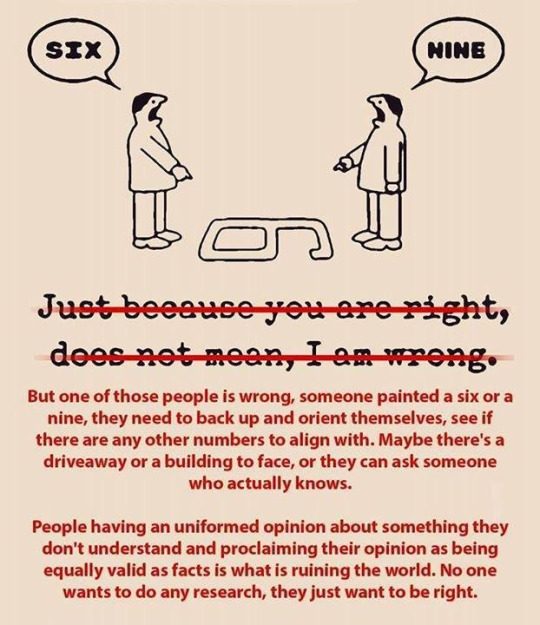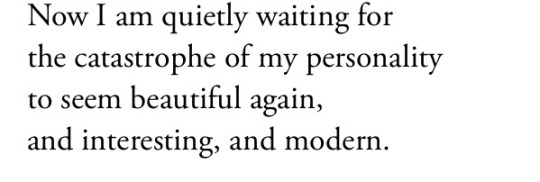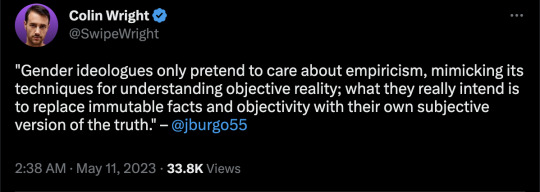#subjectivity
Quote
The dreamer — if you want an exact definition — is not a human being, but a creature of an intermediate sort.
Fyodor Dostoyevsky, "White Nights"
906 notes
·
View notes
Quote
If we are always arriving and departing, it is also true that we are eternally anchored. One's destination is never a place, but rather a new way of looking at things.
Henry Miller, Big Sur and the Oranges of Hieronymus Bosch
#change#perspective#subjectivity#perception#awareness#objectivity#eternal#quotes#Miller#Henry Miller#Big Sur and the Oranges of Hieronymus Bosch
201 notes
·
View notes
Text
I am very tolerant. I am not a moralist. I have too great a sense of the shortness of life and its temptations to rule red lines.
Virginia Woolf, The Waves
#Virginia woolf#the waves#quote#literature#lit#prose#fiction#novel#english literature#tolerance#understanding#empathy#life quote#life#forgiveness#subjectivity#impermanence
42 notes
·
View notes
Text

Or maybe the slide is like Aslan, and gets taller as I do (except without the feeling of discomfort when I reach my teens and suddenly get the Christ stuff)
Subjectivity [Explained]
Transcript Under the Cut
[A tall slide, seen from the ground.]
When I was a kid, my school playground had a really tall slide that always made me nervous.
[A tall slide, seen from the side.]
We moved away, but the slide stuck in my memory, becoming a skyscraping monster.
[A car and a sign pointing to school zone.]
Years later, I was passing through my old town and remembered the playground. I drove to the school to see the slide that my inner six-year-old thought was so towering.
[A huge slide, Cueball beside it.]
AND IT WAS HUGE!
I KNEW IT!
46 notes
·
View notes
Text
The difference
Between Heaven and Hell
Is only a matter
Of perspective
#my writing#poetry#poem#heaven#hell#perspective#good#evil#subjectivity#creative writing#spilled ink#poets on tumblr#writers on tumblr#quick write#writers and poets
13 notes
·
View notes
Text
Curious how most people feel about this.
#polls#crossing my fingers that things don’t get spicy in the notes#art#death of the author#subjectivity
65 notes
·
View notes
Text

#philosophy#quotes#Richard Wright#The Outsider#Wright#interpretation#perception#habits#desires#subjectivity
11 notes
·
View notes
Text
Reading Notes 6: Freud to Lacan to Fanon

We look to Sigmund Freud’s “The Uncanny,” Jacques Lacan’s “The Mirror Stage as Formative of the Function of the I,” and Frantz Fanon’s “The Negro and Psychopathology” for our inquiry into the functions of psychoanalysis and subjectivity when examining visual texts.
Why do people call an experience or event uncanny, and what makes an occurrence that appears to be uncanny but is not uncanny?
What is the relation of personal neurosis to social passions?
In what ways are oppressed and marginalized viewers alienated when they are not or rarely represented?
@theuncannyprofessoro
16 notes
·
View notes
Text

#not mine#but it's important#let's get one thing clear#truth isn't always subjective#sometimes you just need to get over yourself#truth#subjectivity#meme#picture
58 notes
·
View notes
Text

Jordi Galí - In the midst of subjectivity and beauty (2023)
#catalanpainter#contemporaryart#abstractart#abstract#contemporarypainting#jordi gali#spraypaint#collage#subjectivity#beauty#contemporary artist#contemporary art
16 notes
·
View notes
Quote
It's impossible to offend someone if he doesn't want to be offended.
Friedrich Schlegel, Critical Fragments
883 notes
·
View notes
Quote
Each of us has suffered a primordial inner schism with the result that any given human self is only part of a once-intact greater self. Each of us is alienated from the world (man contra world) because each of us is alienated from himself, not just warring or in conflict: no: the parts of the self have become separated from each other and because of that, experience of world is partial, occluded, impaired, deformed. A partial self experiences a partial world, with the result that world is alien, irreal, hostile, strange, arousing perplexity and dread. Man does not understand world because he does not understand himself...
Philip K. Dick, The Exegesis of Philip K. Dick
#self#other#world#alienation#experience#subjectivity#objectivity#quotes#Philip K. Dick#The Exegesis of Philip K. Dick
90 notes
·
View notes
Text

Frank O’Hara, “Mayakovsky”
#frank o’hara#mayakovsky#poetry#quote#literature#lit#beauty#subjectivity#insecurity#self expression#personality#self#ego#self acceptance#external validation
11 notes
·
View notes
Text

By: Joseph Burgo, Ph.D
Published: May 11, 2023
In 1942, the psychoanalyst Helene Deutsch published a landmark paper in which she described a particular type of person who relates to the world and to other people in ways that appear normal but who, over time, comes across as inauthentic. “Every attempt to understand the way of feeling and manner of life of this type forces on the observer the inescapable impression that the individual’s whole relationship to life has something about it which is lacking in genuineness and yet outwardly runs along ‘as if’ it were complete.” Hence the term she coined to denote such people—the “As If” Personality.
When these individuals come for therapy, they often appear to engage enthusiastically in the psychotherapeutic process, though over time, no progress is made; a feeling of futility might plague the therapist. The challenge is to recognize and address a fundamental dynamic crippling the work: rather than being used to convey meaning, the words employed by the client instead conceal and ward off an internal truth felt to be intolerable. The personality enacted for the therapist’s benefit embodies a kind of performance, the simulacrum of an actual person with emotions and connections to other people, when in fact, the person feels empty inside and unable to engage authentically with anyone.
In the early years of my practice, one client (a highly intelligent and verbal young man) once asked, “If you tell me what you believe my unconscious is saying based on what you hear, how am I to know if you’re right? How do I know if some other formulation isn’t what’s actually true?” It’s ultimately up to the client to decide whether an intervention is accurate, of course, but this young man couldn’t connect my words with his inner world to assess their accuracy, largely because he relied upon language to obscure rather than to illuminate. He appeared to be a willing client, but the way he communicated instead made sure I’d never get anywhere near him.
As the treatment progressed, he began to offer alternative interpretations to my own. “That’s one way of looking at it,” he might say. “But it could also be …” At that point in my career, I viewed such client-therapist interactions through the lens of dependency and the common defenses against it; I would have pointed out how he was relating me as if we were colleagues or co-therapists and couldn’t allow himself to be a client depending upon me for help. While that formulation is true, I would now add this: while it appeared as if we were engaged in a psychotherapeutic process, he was thwarting my attempts to make contact by substituting an alternative reality for each one that I proposed. Therapy became a competition via language to define what was “true”; he ultimately won that contest and moved on.
Historians of psychoanalytic thought view Deutsch’s formulation of the “As If” Personality as a precursor to our understanding of borderline conditions and pathological narcissism, and my own clinical experience bears that out. The use of language to obscure or annihilate hated truths regularly features in psychotherapy with clients afflicted by disordered personalities; helping them to connect with and tolerate acute psychic pain is a central challenge of this work and means developing a more authentic language connected to emotional truth.
* * *
In my more recent work with gender-distressed youth, I find myself again confronting this disconnect between language and emotion, but it feels less to me about disordered personalities than a social media-induced kind of dissociation. One teenage girl, trans-identified, talks at length about her daily interactions with her mother, her peers at work and at school, but the space between us feels dead. At times, I have a feeling of futility, that if I try to make sense of the actual words she employs and events she describes, we’ll remain stuck in a place without meaning.
Another client, a highly intellectual young man, uses sessions to expatiate on the socio-cultural construction of gender, explains to me why he rejects masculinity and embraces the feminine, but has no connection with his body. He never masturbates and finds his nocturnal emissions to be disturbing. Now and then for reasons that mystify him, he will begin to weep in session. He feels relieved by his tears but has no words to describe what he might be feeling.
Yet another teenage girl, also trans-identified, adamantly insists upon her desire for cross-sex hormones. Like my other two clients, she has no relationship with her body. She spends much of her free time playing video games online, inhabiting her avatar, and interacting with the avatars of other online players she’s never met in real life. The possibility that testosterone will make her sterile or eventually lead her to have a hysterectomy bothers her not at all; she finds the idea of sexual intercourse to be disgusting and has no intention to marry or have children. She has never masturbated and finds the idea “gross.”
Like many young people who survived the lockdown years by going online, these clients have spent so much time inhabiting virtual worlds that they’ve lost connection with what’s visceral, immediate, and real. They live in a realm of imagination where anything is possible, where infinite malleability has taken the place of a physical world with reality-based limitations. By changing your name and your avatar, you can transform yourself into someone entirely new. The laws governing this alternative space give rise to a belief that you can change the very nature of reality simply by describing it in a different way.
The apparent re-creation of reality via language lends an “as if” quality to their personalities. They seem to have an internal psychic life that’s meaningful to them, they appear to have friends and other social relationships, but their emotional lives lack depth. Because their words have become untrustworthy guides to truth, I’ve taken to teaching my clients about how we human beings come to recognize our own feelings as they arise—when it comes to sadness, for example, through the perception of bodily sensations around the eyes, chest, and back of the throat. With the first client I described above, most times when I ask her to move her attention down into her body, she will begin to cry.
For many young people, social media usage has severed the connection between specific words denoting feelings and the visceral indicators that help us to identify those feelings. The signifier has become detached from the signified. As a result, language becomes a disembodied and self-contained set of internal rules and interrelationships without connection to psychic truth and often external reality.
* * *
In our daily interactions with other people, we usually assume that the words they use to communicate accurately represent the meaning they intend to convey; this fundamental assumption underlies all cooperative efforts to engage with other human beings. But in our modern world, it’s increasingly difficult to believe that much of the language exchanged conveys meaning or objective truth, especially in the contentious realm of social media. Like my patients described above, the public language deployed in this space often serves to deny or obscure truth, to replace it with an alternative reality constructed via language. Life on Twitter often boils down to a war of words to determine whose version of “reality” will prevail, a dynamic obscured by the misleading appearance that both sides are using language in the same way.
In her keynote address last month at Genspect’s historic “The Bigger Picture” conference in Ireland, Helen Joyce, author of the book Trans, drew attention to this issue. While proponents of the affirmative care model for gender-distressed youth speak and write in the empirical language of fact-based science, they actually disdain it. Gender ideology is like a cuckoo bird invading the nest of empiricism says Joyce, appropriating its language and apparently respecting its methods while all the while subverting them. Like my long-ago patient who spoke as if he was authentic and in contact while deploying language to obscure truth, the gender ideologues publish studies in professional journals, written in language that appears to respect the empirical method but actually undermines its assumptions and replaces objective reality with their own disembodied version of “truth.”
The work of Jack Turban, for example, relies upon copious footnotes and citations to other studies which, upon closer examination, either have nothing to do with the position he claims they support or directly contradict it. Turban writes as if he were devoted to the scientific method and its standards of proof but actually cares nothing about them. Colin Wright, Jesse Singal, and Leor Sapir have devoted thousands of words to debunking Turban’s claims, highlighting his factual errors and misleading citations; for those of us firmly rooted in reality, their efforts are crucial, but for Turban and his acolytes, they are irrelevant. Gender ideologues only pretend to care about empiricism, mimicking its techniques for understanding objective reality; what they really intend is to replace immutable facts and objectivity with their own subjective version of the truth.
This dynamic reflects core tenets of post-modern thought and critical theory, where so-called reality is supposedly determined by the discourse around it, and whoever controls that discourse has the power to determine what counts as “true.” While it appears as if gender ideologues are engaged in good faith debate over what scientific studies can tell us about, say, the reality of biological sex, their position really boils down to “because we say so.” They amass flawed and flimsy studies published in professional journals and devote entire books to “proving” sex actually occurs along a spectrum of possible expressions, all in order to control the discourse around the nature of sex. Objective truth is irrelevant; whoever speaks with the loudest voice gets to decide what is true.
Helen Joyce’s observations were inspired by a philosophy symposium she attended focused on the work of British philosopher Roger Scruton; she was particularly struck by his delineation of two opposing views of human nature that give rise to very different ideas about how a society should be governed. One views human nature as a blank slate and believes it can be improved and eventually perfected; from this perspective we are evolving toward an ideal society. The other, “constrained” by the facts of biology and our evolutionary heritage, believes humans cannot fully transcend their bodies, and society must therefore pass laws and uphold traditions that restrain the more brutal aspects of our nature. The American economist Thomas Sowell believes these conflicting visions characterize the conservative versus progressive debate in the United States.
On a broader level, these opposing views also help us to understand the current battle about sex and gender, especially on social media. On the one side we have proponents of biological reality who hold that facts are facts and sex is real; they believe in the scientific method and esteem empiricism as a mode for apprehending truth. On the other, we have those who behave as if they care about the scientific method, but in fact care only about wielding power.
* * *
Just as Helene Deutsche’s landmark paper led to deeper insights into borderline states and pathological narcissism, recognizing the as if quality of contemporary discourse helps explain why our society exhibits so many features of the Cluster B Personality Disorders. Disordered personalities characteristically display overly emotional and irrational forms of thinking along with an unstable sense of self and its relation to others. As patients, they at first appear to engage in the psychotherapeutic process but remain quietly hostile to the process. They will defend their fragile sense of self in often hostile and verbally abusive ways against attempts by their therapist to illuminate painful psychic truths.
Due in part to the rise of social media and the increasing influence of virtual online spaces, young people today inhabit an as if world that mimics reality but actually denies many hated truths about it—that sex is real, binary, and immutable, for example. Adopt a new avatar or change your pronouns and you can become somebody else, even alter your sex. Your subjective belief about who you are overrides objective truth. And if anyone should challenge your self-image by asserting so-called “facts,” you are justified in weaponizing language and hurling abuse to ensure that objective reality will not prevail. Rage, invective, and crude insults to dehumanize the other are the order of the day.
Welcome to Twitter, a place where daily interactions between two conflicting visions of human nature resemble one prolonged eruption of borderline rage. On one side are those who insist reality must be what they say it is; they feel sorry for themselves and persecuted by those who, on the other side, assault them with facts and arguments about objective reality. It takes a non-defensive therapist with a high tolerance for pain and a strong sense of self to work with disordered personalities, in part because they so often attack your own sense of self-worth when they feel threatened; it’s no wonder that even the rationalists ultimately resort to contempt and abuse as Twitter discourse descends into name-calling on both sides.
How are we to heal a disordered society such as ours? Most of the time, I’m cautiously optimistic that the Colin Wrights and Jesse Singals of the world will eventually prevail and, through dispassionate analysis and assertions of fact, reinforce our connections to objective reality. But sometimes, in the dark of the night, I worry that the proponents of radical subjectivity will win. Like my long-ago patient who defeated my efforts to connect him with psychic truth and who ultimately destroyed his own treatment, they will shout the rest of us down with brutal abuse, in the process annihilating all the glorious achievements of Western Civilization and the Enlightenment.
==
Ideologues like Jack Turban don't post for truth, but for narrative. This is the guy who, like Kendi, blew up his core premise with a single tweet.
Turban's strategy is one he's learned from media on both sides: publish the narrative you want to be true up front (especially in the headline or summary); that's the story the initial wave of your most regular readers will see and retain; when forced to clarify, correct or retract, do so quietly; now you can say it's correct, but you've already convinced your regular readers of the original version.
It's designed to create repeatable memes, with the theater of linking to studies, regardless of whether what he's citing actually says what he claims, or even refutes something else he's already said.
#Joseph Burgo#antiscience#anti Enlightenment#anti science#gender ideology#queer theory#objective reality#mental health crisis#my truth#delusion#subjective reality#subjectivity#radical subjectivity#authoritarianism#woke authoritarianism#chronically online#mental health#mental health issues#religion is a mental illness
33 notes
·
View notes
Quote
I feel the most affinity with Marriott’s writing when it illuminates blackness as a structural position, as an ontology rather than an identity or sociological experience, though the latter is usually what we mean when we say “race.” Too often our work is singularly focused on individual experience or relies on a Cartesian form of consciousness. Such work focuses on black people’s identities or stops at what black folks say about their experience without interrogating the conditions that make such speech possible and without interrogating the limits of consciousness itself. I worry that in this work, history and structure disappear. It is my view that the lives of black people of all genders are structured in the context of antiblack existential negation, but it is rare to have our position as shattered subjects theorized and even rarer for it to be theorized with deep attentiveness to gender and sexuality — as Marriott does. His scholarship speaks to the existential paradox of blackness, what I refer to as “existential negation” in this essay —namely, to have subjectivity while one’s subjecthood is constantly negated, one’s voice made inaudible by cultural fantasy, and one’s ego assailed by an Other that is inseparable from the self.[3] Marriott is known as an elegant theorist of psychoanalysis and culture. But I have been most struck by the ethics of his writing — in particular, by its ability to bring into focus the world’s collective disavowal of the violence subtending the production of blackness. This collective disavowal exists despite or because of the centrality of antiblackness for the production of the world’s sociality. The imagistic quality of the prose is the stuff of nightmares: the dread- inspiring quality of the unconscious life of race, a nightmarish vision of black men that has been imposed across the color line.
Zakiyyah Iman Jackson - Waking Nightmares—on David Marriott. [GLQ 1 June 2011; 17 (2-3): 357–363]
#zakiyyah iman jackson#david marriott#thinkers#intellectuals#theory#afropessimism#anti-blackness#subjectivity#othering#negation#psychoanalysis#blackness#existentialism
27 notes
·
View notes
Text

24 notes
·
View notes